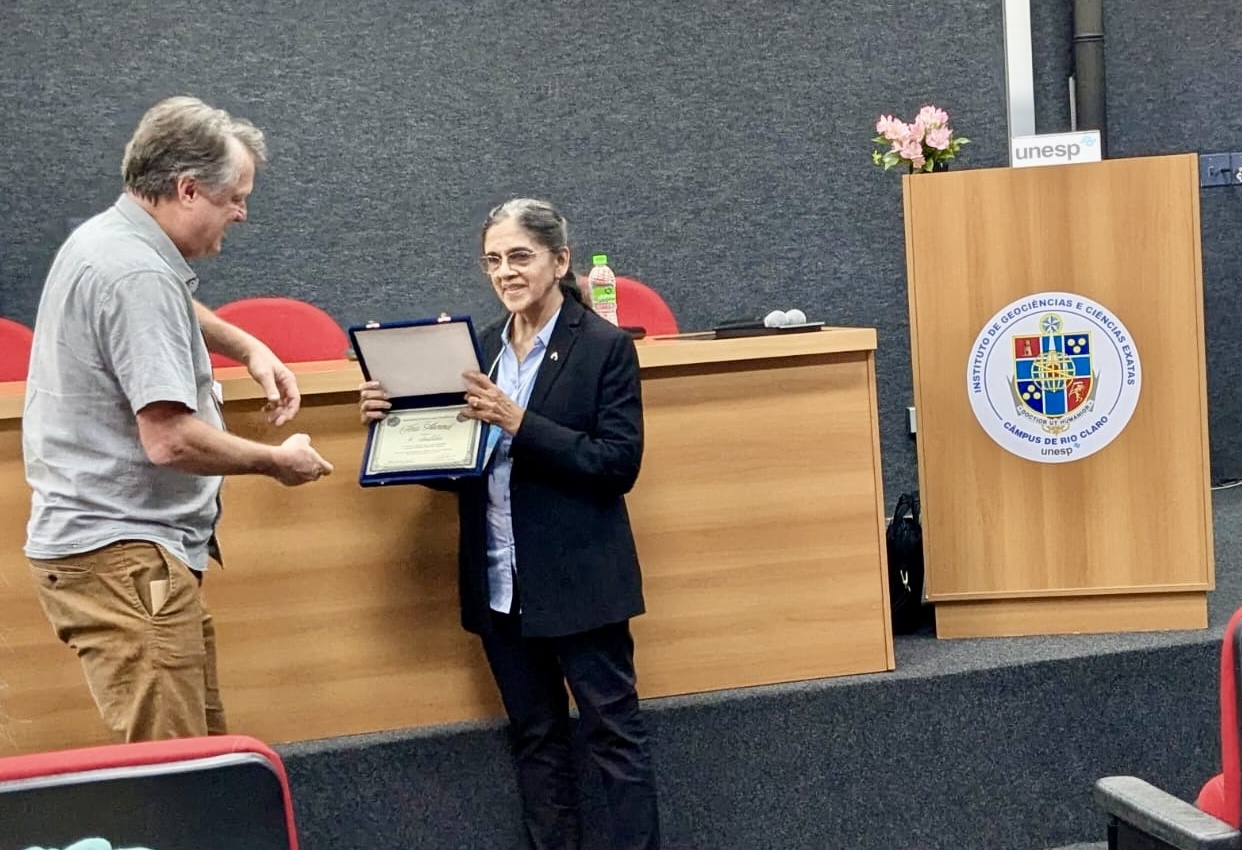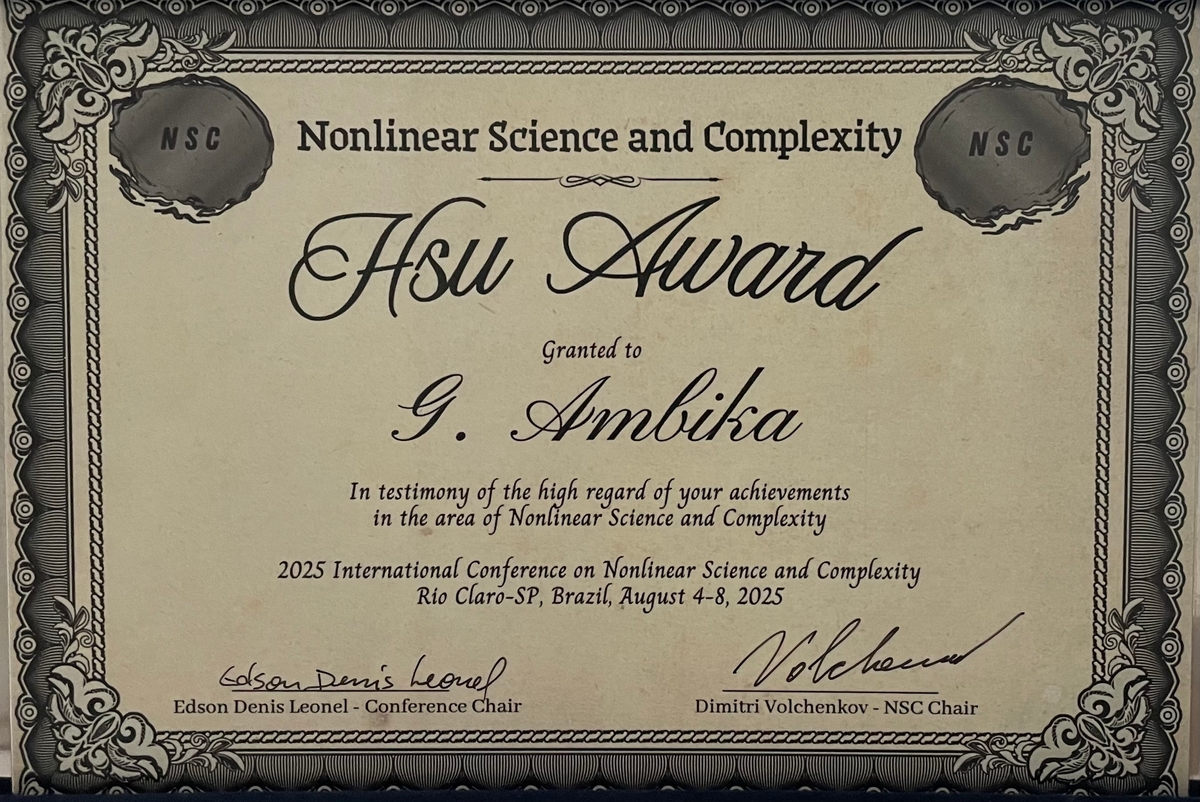
Prof G. Ambika
Honorary Professor (Physics)
Zy5hbWJpa2FAaWlzZXJ0dm0uYWMuaW4=
Prof G. Ambika and her group focus on understanding complex systems from the theory of nonlinear dynamics and complex networks and measures of their complexity from observational data.
Life Of A Researcher | Ep 1: in talks with Prof. G Ambika
Prof G. Ambika was awarded the C. S. Hsu Award in 2025, for distinguished scholars in Nonlinear Dynamics and Control.
This international award, in recognition of her achievements in the area of Nonlinear Dynamics and Complexity, was presented during the international conference, NSC2025 at UNESP(Universidade Estadual Paulista) in Rio Claro, São Paulo, Brazil during Aug 04-08, 2025


Recent publications
- Aiwin T Vadakkan and G. Ambika, Relay synchronization and control of dynamics in multiplex networks with unidirectional inter layer coupling 2025, Physica D: Nonlinear Phenomena, 478,134715, https://doi.org/10.1016/j.physd.2025.134715
- Aiwin T Vadakkan, Umesh Kumar Verma and G. Ambika, Recovery of synchronized oscillations on multiplex networks by tuning dynamical time scales, 2024, Physics Letters A 525 , 129842, doi.org/10.1016/j.physleta.2024.129842 -
https://authors.elsevier.com/a/1jiea_8Z60zi%7EO - Joshin John Bejoy, and G. Ambika, Recurrence analysis of meteorological data from climate zones in India, 2024, Chaos 34, 043150 ; doi: 10.1063/5.0165282- chosen as Featured Article - https://pubs.aip.org/aip/cha
- Dheeraja Thakur, Athul Mohan, G Ambika, and Chandrakala Meena- Machine learning approach to detect dynamical states from recurrence measures, 2024, Chaos 34, 043151 ; doi: 10.1063/5.0196382( chosen as Editor’s pick)
- Sandip V. George, Sneha Kachhara and G. Ambika , Early warning signals for critical transitions in complex systems, 2023, Phys. Scr. 98 072002 https://doi.org/10.1088/1402-4896/acde20
- Vedang Tamhane and G. Ambika , Structure and Stability of the Indian Power Transmission Network, 2023 J. Phys. Complex. 4, 025014. https://doi.org/10.1088/2632-072X/acd611
Dynamics of complex systems
- Frequency chimera - introduced a new chimera state , in coupled systems with multiple dynamical time scales
- Chimera states in multiplex networks: occurrence of Chimera states in one layer due to the influence of another layer in multiplex recurrence networks.
- Synapse loss and progress of Alzheimer's disease: a network model of neurons, that explains the loss of coordinated activity and transmission efficiency among neurons that manifests over time due to loss functional synapses.
- A novel coupling scheme for delay or anticipatory synchronization: with variable delay with applications in secure communication
- Environmental coupling in complex systems: emergent states like amplitude death and control of spatio temporal dynamics
- RAndom Interacting Network (RAIN) model: novel scheme to study the interactions between complex networks
- Evolving bimodal networks: A new procedure for constructing a network with bimodal degree distribution using immunity score
- Degree preserving rewiring methods and effects of link deletion: effects on clustering and degree-correlations in directed networks.
Dynamics from data of Complex systems
- Multiplex Recurrence networks from multichannel ECG data: an integrated approach to analyze the multi-lead ECG data is possible using multiplex recurrence networks (MRNs) constructed from the embedded dynamics from channel wise data. This helps to differentiate various disease cases from healthy ones.
- Early warning signals for the mysterious dimming of the star Betelgeuse: proposed signals of a critical transition in its pulsation dynamics, as indicated by increase in values of a set of measures, responsible for the dimming episode of 2019-20
- Classification of close binary stars using recurrence networks: use of machine learning algorithms applied to measures of recurrence networks and nonlinear time series analysis to differentiate between classes of close binary stars.
- Bimodal degree distribution and scaling in Recurrence networks from ECG data
- Complexity and connectivity measures: Multifractal measures computed from physiological and astrophysical data
- New measures: introduced measures like heterogeneity measure, entropy and weighted recurrence networks for studying recurrence patterns in data
Earlier contributions
- Natural numbers network using the divisibility pattern of natural numbers for growing a complex network and its complexity measures for prime and composite numbers
- Community structured modular network of chaotic neurons with inhibitory synapses
- Heterogeneity in the dynamical time scales of connected nonlinear dynamical systems
- Model for primary and secondary dengue infections
- Virus Immune Drug dynamics
- Stochastic Resonance & Vibrational resonance, lattice stochastic resonance
- Universal indices and RG analysis in 1-d maps
- Hamiltonian format for quadratically damped nonlinear systems
